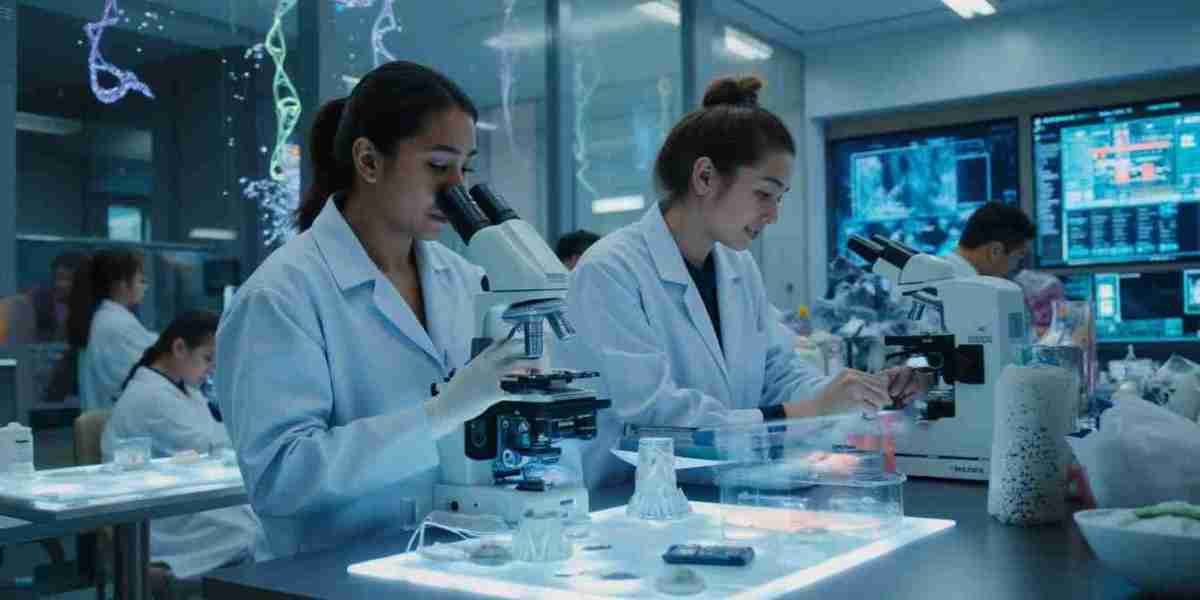Introduction
Biotechnology has emerged as one of the most promising fields of engineering in the 21st century. From healthcare innovations and agricultural advancements to environmental sustainability and industrial applications, biotechnology is shaping the future of science and human life. For students who aspire to be part of this cutting-edge field, choosing the right academic institution is critical.
Dr. M.C. Saxena Group of Colleges (MCSGOC), Lucknow, stands out as one of the pioneering institutions offering high-quality Biotechnology engineering programs in India. With a strong legacy in engineering education, state-of-the-art laboratories, industry collaborations, and a student-centric approach, MCSGOC provides a platform where innovation meets opportunity.
This blog offers an in-depth look at the Biotechnology Engineering program at MCSGOC, narrated from a student’s perspective—covering academics, campus life, research, and career opportunities.
Chapter 1: Understanding Biotechnology Engineering
Biotechnology engineering is a multidisciplinary branch of engineering that integrates biology with technology. It combines principles from biology, chemistry, physics, mathematics, and computer science to design products and processes that improve health, agriculture, environment, and industry.
Students pursuing biotechnology engineering study subjects like:
Molecular Biology and Genetics
Biochemistry and Microbiology
Genetic Engineering and Immunology
Bioinformatics
Bioprocess Engineering
Environmental Biotechnology
This field is vast, and its scope is continuously expanding due to advances in genomics, pharmaceuticals, and artificial intelligence applications in life sciences.
Chapter 2: Why Choose MCSGOC for Biotechnology Engineering?
As a student exploring options, I realized that MCSGOC has some unique advantages that make it a top choice for biotechnology education.
Strong Academic Foundation – The curriculum at MCSGOC is carefully designed to blend theoretical knowledge with practical skills.
World-class Infrastructure – The college provides advanced labs in molecular biology, fermentation, bioinformatics, and tissue culture.
Research and Innovation Culture – Students are encouraged to participate in funded research projects and innovation challenges.
Expert Faculty – The teaching staff includes experienced academicians, Ph.D. scholars, and industry professionals.
Global Exposure – Collaborations with industries and research centers expose students to real-world applications.
Chapter 3: Academic Curriculum at MCSGOC
The Biotechnology engineering program at MCSGOC is structured to provide progressive learning over four years.
Year 1: Foundation
Basics of Engineering, Mathematics, and Physics
Introduction to Biology & Chemistry
Communication and Technical Skills
Year 2: Core Biotechnology
Cell Biology & Genetics
Biochemistry
Microbiology
Computational Biology
Year 3: Specialization and Applications
Genetic Engineering
Immunology
Bioprocess Engineering
Industrial Biotechnology
Year 4: Research & Career Readiness
Biotechnology Project Work
Industrial Internship
Entrepreneurship & Innovation modules
Electives in Bioinformatics, Nanobiotechnology, or Environmental Engineering
From my perspective, this gradual buildup of knowledge keeps students motivated and ready for advanced concepts.
Chapter 4: Laboratory & Research Facilities
A defining strength of MCSGOC is its emphasis on practical training. Some of the key labs available to students include:
Molecular Biology Lab – for DNA/RNA extraction, PCR, cloning.
Microbiology Lab – microbial culturing, antibiotic resistance studies.
Fermentation Lab – industrial enzyme and biofuel production.
Tissue Culture Lab – plant and animal cell culture experiments.
Bioinformatics Lab – genomic analysis and computational biology.
For a student, these labs provide hands-on experiences that go beyond textbooks. Working with real-world experiments builds confidence and nurtures curiosity.
Chapter 5: Industry Collaboration and Internships
Biotechnology engineering is highly industry-oriented, and MCSGOC bridges this gap by providing students with exposure to:
Internships at pharmaceutical and biotech companies.
Industrial visits to research labs, food industries, and hospitals.
Guest lectures by scientists and entrepreneurs.
Students often participate in projects like biofertilizer development, drug formulation, and wastewater treatment. Such collaborations ensure graduates are job-ready.
Chapter 6: Campus Life at MCSGOC
Life at Dr. M.C. Saxena Group of Colleges goes beyond academics. From a student’s perspective, the vibrant campus culture helps in overall personality development.
Clubs and Societies – Biotechnology Club, Innovation Cell, Cultural Societies.
Sports & Fitness – Facilities for cricket, football, badminton, and gym.
Events & Festivals – Annual tech-fest, cultural fests, seminars, and hackathons.
Hostel & Facilities – Comfortable hostels, canteen, Wi-Fi, and transport.
The balance between academics and extracurriculars makes the student journey enjoyable.
Chapter 7: Career Opportunities After Biotechnology Engineering
Graduates from MCSGOC find opportunities across multiple domains:
Pharmaceuticals & Healthcare – drug discovery, vaccine development.
Agriculture & Food Industry – genetically modified crops, food safety.
Environmental Sector – bioremediation, waste management.
Industrial Biotechnology – biofuels, enzymes, fermentation products.
Research & Academia – higher studies (M.Tech, Ph.D.) and teaching.
The placement cell at MCSGOC connects students with reputed recruiters in biotechnology and allied industries.
Chapter 8: Alumni Achievements & Student Testimonials
Many alumni from the biotechnology program at MCSGOC have gone on to successful careers in multinational companies, research institutes, and even as entrepreneurs. Their achievements inspire current students to aim higher.
Students often highlight:
Supportive faculty
Hands-on research opportunities
Exposure to innovation and entrepreneurship
Chapter 9: The Future of Biotechnology and Student Role
As biotechnology continues to revolutionize healthcare, agriculture, and sustainability, students trained at MCSGOC will play a crucial role in shaping the future. With the rise of AI-driven biotech research, nanotechnology, and personalized medicine, the scope for students is limitless.
Conclusion
Choosing the right institution can shape your academic and professional journey. For students aspiring to build a career in biotechnology, Dr. M.C. Saxena Group of Colleges (MCSGOC) offers a perfect blend of academic excellence, research exposure, and industry readiness.
From the student’s perspective, the Biotechnology Engineering Program here is not just about learning but also about experiencing science in action, innovating for real-world problems, and building a successful future.
If you’re passionate about biology, technology, and innovation, Biotechnology engineering programs at MCSGOC can be your gateway to an exciting career.
Frequently Asked Questions (FAQ)
1. What are Biotechnology Engineering Programs?
Biotechnology engineering programs are specialized courses that combine biology and technology to develop products and processes beneficial for healthcare, agriculture, industry, and the environment. These programs teach students the principles of genetics, microbiology, bioinformatics, and bioprocess engineering.
2. Why should I choose Biotechnology engineering at MCSGOC?
Dr. M.C. Saxena Group of Colleges (MCSGOC) offers one of the most comprehensive Biotechnology engineering programs in India. With advanced laboratories, experienced faculty, industry collaborations, and a strong emphasis on research, students gain the skills required to succeed in both academic and professional fields.
3. Is Biotechnology engineering a good career option in India?
Yes, biotechnology engineering is a rapidly growing career option in India. With increasing investments in healthcare, agriculture, pharmaceuticals, and environmental sustainability, biotechnologists are in high demand. Graduates can work in research labs, pharmaceutical companies, and biotech industries, or pursue higher studies.
4. What is the duration of the Biotechnology engineering program at MCSGOC?
The undergraduate Biotechnology engineering program at MCSGOC is a 4-year full-time degree course, divided into 8 semesters, with a balance of theory, laboratory work, and internships.
5. What subjects are taught in Biotechnology engineering at MCSGOC?
Students study a wide range of subjects such as Molecular Biology, Biochemistry, Microbiology, Genetics, Immunology, Bioprocess Engineering, Environmental Biotechnology, and Bioinformatics. In addition, they are trained in communication, management, and entrepreneurship skills.
6. Does MCSGOC provide practical training in Biotechnology?
Yes. Practical training is a cornerstone of the biotechnology program at MCSGOC. Students gain hands-on experience in specialized labs such as molecular biology, fermentation, tissue culture, microbiology, and bioinformatics labs.
7. Are internships part of the Biotechnology engineering program?
Absolutely. MCSGOC has tie-ups with pharmaceutical companies, biotech firms, and research organizations where students undertake internships. This exposure prepares them for industry challenges and job readiness.
8. What kind of career opportunities are available after completing Biotechnology engineering?
Graduates can explore careers in:
Pharmaceutical & healthcare companies
Food & agriculture industries
Environmental conservation projects
Research & development centers
Bioinformatics and computational biology firms
They can also pursue higher studies or entrepreneurial ventures.
9. Does MCSGOC offer placement support for Biotechnology students?
Yes, the college has a dedicated placement cell that helps students secure opportunities in reputed companies, research organizations, and startups. Alumni from MCSGOC Biotechnology programs are successfully placed in national and international companies.
10. Can students pursue higher studies after Biotechnology engineering?
Yes. After completing the undergraduate program, students can pursue M.Tech, M.Sc., or Ph.D. in biotechnology or related fields. Specializations like genetic engineering, molecular biology, and bioinformatics are popular for advanced studies.
11. What facilities does MCSGOC provide for Biotechnology students?
MCSGOC provides modern classrooms, state-of-the-art biotechnology labs, libraries with research journals, hostel facilities, sports infrastructure, Wi-Fi-enabled campus, and a supportive learning environment.
12. How is the faculty for Biotechnology at MCSGOC?
The faculty comprises highly qualified professors, researchers, and industry professionals. Many faculty members hold Ph.D. degrees and actively publish research papers, ensuring that students learn from both academic and practical perspectives.
13. Is research encouraged in the Biotechnology program?
Yes, research is strongly encouraged. Students are given opportunities to work on projects funded by government bodies and industries. They are also encouraged to present their work at seminars, conferences, and innovation competitions.
14. Can Biotechnology students become entrepreneurs?
Definitely. With knowledge of genetics, microbiology, and industrial processes, students can start ventures in biofertilizers, organic farming, biofuels, or healthcare innovations. MCSGOC also provides entrepreneurship support through its innovation cell.
15. What is the scope of Biotechnology engineering abroad?
The scope abroad is immense. Countries like the USA, UK, Germany, Singapore, and Australia invest heavily in biotech research. Graduates can pursue higher studies, research positions, or industry jobs in pharmaceuticals, agriculture, and environmental biotechnology.
16. What kind of projects do Biotechnology students work on at MCSGOC?
Students often work on projects like:
Wastewater treatment using microbes
Biofertilizer development
Plant tissue culture and crop improvement
Vaccine and drug formulation
Enzyme and biofuel production
17. Does Biotechnology engineering at MCSGOC cover modern technologies like bioinformatics?
Yes. The curriculum includes bioinformatics and computational biology, which are essential for analyzing genetic data, protein structures, and molecular interactions. This prepares students for careers in data-driven biotechnology research.
18. How does MCSGOC support students’ overall development?
Apart from academics, MCSGOC encourages students to participate in cultural events, sports, clubs, and leadership activities. Personality development programs and soft-skill workshops help students build confidence for interviews and career growth.
19. What are the eligibility criteria for admission to Biotechnology engineering at MCSGOC?
Students who have completed 10+2 with Physics, Chemistry, and Biology/Mathematics as core subjects are eligible. Admission is usually based on merit or entrance examinations as per university guidelines.
20. Why is Biotechnology considered the future of science?
Biotechnology addresses some of humanity’s biggest challenges, including food security, disease management, renewable energy, and environmental sustainability. With advancements in genetic engineering, nanotechnology, and artificial intelligence, biotechnology is truly the science of the future.












